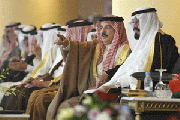A very dangerous situation is developing in the Arab World. It behooves everyone who is truly concerned with the future of the Middle East to look past the ‘Arab Spring’ or the ‘Arab revolution’ and understand the mighty storm gathering in the region.
Fears of the regional Persian giant Iran are guiding U.S. foreign policy much more than any desire to promote democracy in the region. The worst imaginable torture and human rights abuses are occurring right now in Bahrain. Saudi Arabia and other states in the Arab Gulf are hiding protests the U.S. knows are happening and these states certainly have no semblance of democracy. Yet there is no condemnation coming out of Washington against Bahrain or Saudi Arabia, although the United States is very quick to lambast Syria and Iran and has made a huge deal out of supporting the rebels in Libya. The kingdom was even allowed to send troops to Bahrain to help put down the uprising by that country’s majority Shi’a population.
The revolutions sweeping the Arab World have provided the West with an opportunity. The U.S. has made a pact with the Gulf states to support their tyrannical regimes from the Arab uprisings in exchange for the Gulf states standing with the West in a regional showdown between them and Iran. Early hesitancy on the part of the Gulf states to voice public criticism of Iran has, since WikiLeaks revelations, dissolved and the conflict is now out in the open. A war of words has erupted with resultant escalation of tensions between Sunni and Shi’a across that region, putting it at the brink of its worst risk of devastation yet, through a sectarian civil war that transcends borders.
In their battle with Iran, it’s not a secret that the United States seeks to undermine the stong Iranian-Syrian-Hizbullah-Hamas alliance.
These are people who will not bow to Western hegemony or live in subservience to those who would maintain their undeveloped status and steal their natural resources to support their own ‘superior standard of living.’ In its ultimate battle against Iran, a U.S. victory is difficult if not impossible with the Syrians on the side of Iran. Politically and geographically, the Syrians allied with Iran make the enemy nearly unbeatable. This explains why the U.S. has tried so hard to break this alliance.
In 2004, UN Resolution 1559 mainly attempted to force Syria out of Lebanon and strip Hizbullah of its weapons. It accomplished the first when former Prime Minister Rafiq al-Hariri was assassinated in February 2005 and Syria left. However, until now the U.S. has failed to strip Hizbullah of its weapons, even after the summer 2006 33-day war against the Lebanese group. In fact they became much stronger and better armed and consequently the alliance became stronger. They next attempted to do it with the UN Special Tribunal on Lebanon, pinning the blame for the murder of Hariri on Hizbullah in the latest attempt to delegitimize it. However, another opportunity arose to weaken the alliance and perhaps to break it: Revolutions sweeping the region meant that the Syrian regime had to go too, as far as the West was concerned. Now the U.S. sees an opportunity to weaken Syria and although Bahrain is torturing its own citizens and the U.S. says nothing, it expounds frequently and loudly that Assad must go.
It’s true that reforms are badly needed in Syria. It’s true that emergency law must be lifted, political parties allowed and other democratic reforms should come about. But it is important that those who want such reforms in Syria are careful about how they progress. They should not allow outside interests to co-opt their battle for reform in Syria for reasons other than improving the lot of its citizens.
For the Arab reformers, it is most important that they carefully discern legitimate calls for legitimate democratic reforms from attempts by the West or their clients to co-opt the movement for their own interests.
Finally, it is shameful that Al Jazeera was caught in the middle of this unraveling and chose to side with the despots, particularly in Bahrain and in favor of the Gulf states against Iran fueling a sectarian rift between Sunni and Shi’a in the region. The news giant, until now a highly respected source of information on the Arab World, has suffered hits to its credibility that make it very uncertain that it will ever recover.






Leave a Reply